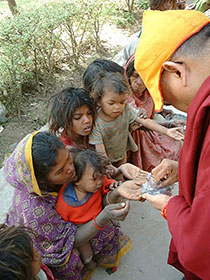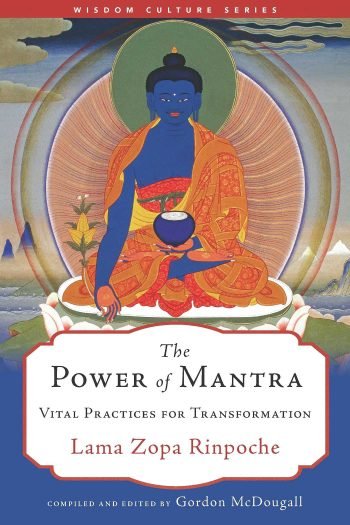- Home
- FPMT Homepage
Foundation for the Preservation of the Mahayana Tradition
The FPMT is an organization devoted to preserving and spreading Mahayana Buddhism worldwide by creating opportunities to listen, reflect, meditate, practice and actualize the unmistaken teachings of the Buddha and based on that experience spreading the Dharma to sentient beings. We provide integrated education through which people’s minds and hearts can be transformed into their highest potential for the benefit of others, inspired by an attitude of universal responsibility and service. We are committed to creating harmonious environments and helping all beings develop their full potential of infinite wisdom and compassion. Our organization is based on the Buddhist tradition of Lama Tsongkhapa of Tibet as taught to us by our founders Lama Thubten Yeshe and Lama Thubten Zopa Rinpoche.
- Willkommen
Die Stiftung zur Erhaltung der Mahayana Tradition (FPMT) ist eine Organisation, die sich weltweit für die Erhaltung und Verbreitung des Mahayana-Buddhismus einsetzt, indem sie Möglichkeiten schafft, den makellosen Lehren des Buddha zuzuhören, über sie zur reflektieren und zu meditieren und auf der Grundlage dieser Erfahrung das Dharma unter den Lebewesen zu verbreiten.
Wir bieten integrierte Schulungswege an, durch denen der Geist und das Herz der Menschen in ihr höchstes Potential verwandelt werden zum Wohl der anderen – inspiriert durch eine Haltung der universellen Verantwortung und dem Wunsch zu dienen. Wir haben uns verpflichtet, harmonische Umgebungen zu schaffen und allen Wesen zu helfen, ihr volles Potenzial unendlicher Weisheit und grenzenlosen Mitgefühls zu verwirklichen.
Unsere Organisation basiert auf der buddhistischen Tradition von Lama Tsongkhapa von Tibet, so wie sie uns von unseren Gründern Lama Thubten Yeshe und Lama Thubten Zopa Rinpoche gelehrt wird.
- Bienvenidos
La Fundación para la preservación de la tradición Mahayana (FPMT) es una organización que se dedica a preservar y difundir el budismo Mahayana en todo el mundo, creando oportunidades para escuchar, reflexionar, meditar, practicar y actualizar las enseñanzas inconfundibles de Buda y en base a esa experiencia difundir el Dharma a los seres.
Proporcionamos una educación integrada a través de la cual las mentes y los corazones de las personas se pueden transformar en su mayor potencial para el beneficio de los demás, inspirados por una actitud de responsabilidad y servicio universales. Estamos comprometidos a crear ambientes armoniosos y ayudar a todos los seres a desarrollar todo su potencial de infinita sabiduría y compasión.
Nuestra organización se basa en la tradición budista de Lama Tsongkhapa del Tíbet como nos lo enseñaron nuestros fundadores Lama Thubten Yeshe y Lama Zopa Rinpoche.
A continuación puede ver una lista de los centros y sus páginas web en su lengua preferida.
- Bienvenue
L’organisation de la FPMT a pour vocation la préservation et la diffusion du bouddhisme du mahayana dans le monde entier. Elle offre l’opportunité d’écouter, de réfléchir, de méditer, de pratiquer et de réaliser les enseignements excellents du Bouddha, pour ensuite transmettre le Dharma à tous les êtres. Nous proposons une formation intégrée grâce à laquelle le cœur et l’esprit de chacun peuvent accomplir leur potentiel le plus élevé pour le bien d’autrui, inspirés par le sens du service et une responsabilité universelle. Nous nous engageons à créer un environnement harmonieux et à aider tous les êtres à épanouir leur potentiel illimité de compassion et de sagesse. Notre organisation s’appuie sur la tradition guéloukpa de Lama Tsongkhapa du Tibet, telle qu’elle a été enseignée par nos fondateurs Lama Thoubtèn Yéshé et Lama Zopa Rinpoché.
Visitez le site de notre Editions Mahayana pour les traductions, conseils et nouvelles du Bureau international en français.
Voici une liste de centres et de leurs sites dans votre langue préférée
- Benvenuto
L’FPMT è un organizzazione il cui scopo è preservare e diffondere il Buddhismo Mahayana nel mondo, creando occasioni di ascolto, riflessione, meditazione e pratica dei perfetti insegnamenti del Buddha, al fine di attualizzare e diffondere il Dharma fra tutti gli esseri senzienti.
Offriamo un’educazione integrata, che può trasformare la mente e i cuori delle persone nel loro massimo potenziale, per il beneficio di tutti gli esseri, ispirati da un’attitudine di responsabilità universale e di servizio.
Il nostro obiettivo è quello di creare contesti armoniosi e aiutare tutti gli esseri a sviluppare in modo completo le proprie potenzialità di infinita saggezza e compassione.
La nostra organizzazione si basa sulla tradizione buddhista di Lama Tsongkhapa del Tibet, così come ci è stata insegnata dai nostri fondatori Lama Thubten Yeshe e Lama Zopa Rinpoche.
Di seguito potete trovare un elenco dei centri e dei loro siti nella lingua da voi prescelta.
- 欢迎 / 歡迎
简体中文
“护持大乘法脉基金会”( 英文简称:FPMT。全名:Foundation for the Preservation of the Mahayana Tradition) 是一个致力于护持和弘扬大乘佛法的国际佛教组织。我们提供听闻,思维,禅修,修行和实证佛陀无误教法的机会,以便让一切众生都能够享受佛法的指引和滋润。
我们全力创造和谐融洽的环境, 为人们提供解行并重的完整佛法教育,以便启发内在的环宇悲心及责任心,并开发内心所蕴藏的巨大潜能 — 无限的智慧与悲心 — 以便利益和服务一切有情。
FPMT的创办人是图腾耶喜喇嘛和喇嘛梭巴仁波切。我们所修习的是由两位上师所教导的,西藏喀巴大师的佛法传承。
繁體中文
護持大乘法脈基金會”( 英文簡稱:FPMT。全名:Found
ation for the Preservation of the Mahayana Tradition ) 是一個致力於護持和弘揚大乘佛法的國際佛教組織。我們提供聽聞, 思維,禪修,修行和實證佛陀無誤教法的機會,以便讓一切眾生都能 夠享受佛法的指引和滋潤。 我們全力創造和諧融洽的環境,
為人們提供解行並重的完整佛法教育,以便啟發內在的環宇悲心及責 任心,並開發內心所蘊藏的巨大潛能 — 無限的智慧與悲心 – – 以便利益和服務一切有情。 FPMT的創辦人是圖騰耶喜喇嘛和喇嘛梭巴仁波切。
我們所修習的是由兩位上師所教導的,西藏喀巴大師的佛法傳承。 察看道场信息:
- FPMT Homepage
- News/Media
-
- Study & Practice
-
-
- About FPMT Education Services
- Latest News
- Programs
- New to Buddhism?
- Buddhist Mind Science: Activating Your Potential
- Heart Advice for Death and Dying
- Discovering Buddhism
- Living in the Path
- Exploring Buddhism
- FPMT Basic Program
- FPMT Masters Program
- FPMT In-Depth Meditation Training
- Maitripa College
- Lotsawa Rinchen Zangpo Translator Program
- Universal Education for Compassion & Wisdom
- Online Learning Center
-
- Prayers & Practice Materials
- Overview of Prayers & Practices
- Full Catalogue of Prayers & Practice Materials
- Explore Popular Topics
- Benefiting Animals
- Chenrezig Resources
- Death & Dying Resources
- Lama Chopa (Guru Puja)
- Lama Zopa Rinpoche: Compendium of Precious Instructions
- Lama Zopa Rinpoche: Life Practice Advice
- Lama Zopa Rinpoche Practice Series
- Lamrim Resources
- Mantras
- Prayer Book Updates
- Purification Practices
- Sutras
- Thought Transformation (Lojong)
- Audio Materials
- Dharma Dates - Tibetan Calendar
- Translation Services
- Publishing Services
- Ways to Offer Support
- Prayers & Practice Materials
-
- Teachings and Advice
- Find Teachings and Advice
- Lama Zopa Rinpoche Advice Page
- Lama Zopa Rinpoche: Compendium of Precious Instructions
- Lama Zopa Rinpoche Video Teachings
- ༧སྐྱབས་རྗེ་བཟོད་པ་རིན་པོ་ཆེ་མཆོག་ནས་སྩལ་བའི་བཀའ་སློབ་བརྙན་འཕྲིན།
- Podcasts
- Lama Yeshe Wisdom Archive
- Buddhism FAQ
- Dharma for Young People
- Resources on Holy Objects
- Teachings and Advice
-
-
*If a menu item has a submenu clicking once will expand the menu clicking twice will open the page.
-
-
- Centers
-
- Teachers
-
- Projects
-
-
-
-
*If a menu item has a submenu clicking once will expand the menu clicking twice will open the page.
-
-
- FPMT
-
-
-
-
-
Buddhism is not at all a tactful religion, always trying to avoid giving offense. Buddhism addresses precisely what you are and what your mind is doing in the here and now. That’s what makes it so interesting.
Lama Thubten Yeshe
-
-
-
- Shop
-
-
-
The Foundation Store is FPMT’s online shop and features a vast selection of Buddhist study and practice materials written or recommended by our lineage gurus. These items include homestudy programs, prayers and practices in PDF or eBook format, materials for children, and other resources to support practitioners.
Items displayed in the shop are made available for Dharma practice and educational purposes, and never for the purpose of profiting from their sale. Please read FPMT Foundation Store Policy Regarding Dharma Items for more information.
-
-
Advice from Lama Zopa Rinpoche
18
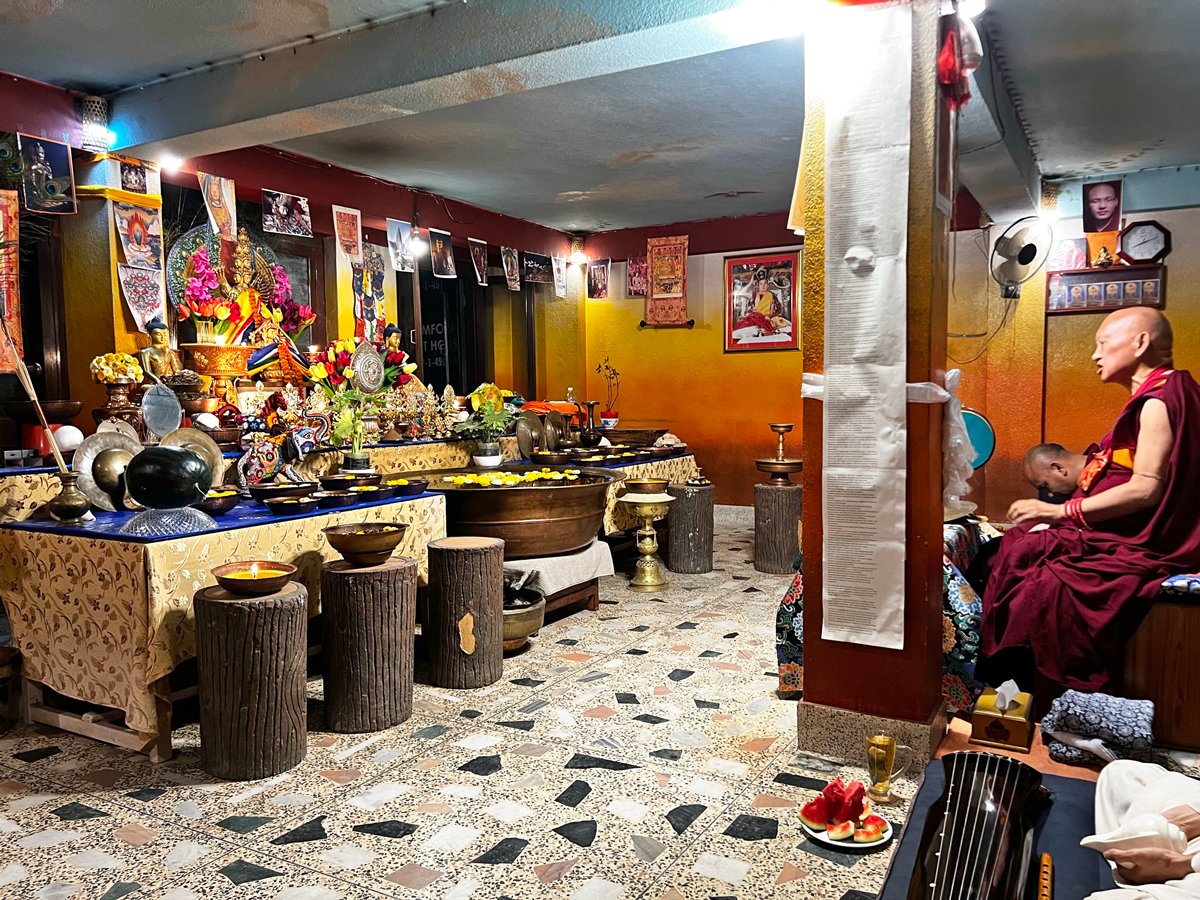
Rinpoche making prayers in offering room overlooking Boudha Stupa, Nepal, April 2022. Photo by Ven. Roger Kunsang.
In January, Lama Zopa Rinpoche gave advice on how to collect “the most unbelievable merit” when making offerings, recently published as Offerings to the Boudha Stupa. Rinpoche offered this advice in relation to a rented room that overlooks Boudha Stupa, in Nepal, and that has been filled with offerings. Rinpoche’s advice was printed, framed, and hung in this offering room to serve as a reminder of how one should make offerings.
This advice from Rinpoche, however, can be followed whenever offerings are made to holy objects as it contains the essence of the meditation for making offerings, which Rinpoche elaborated in Extensive Offering Practice.
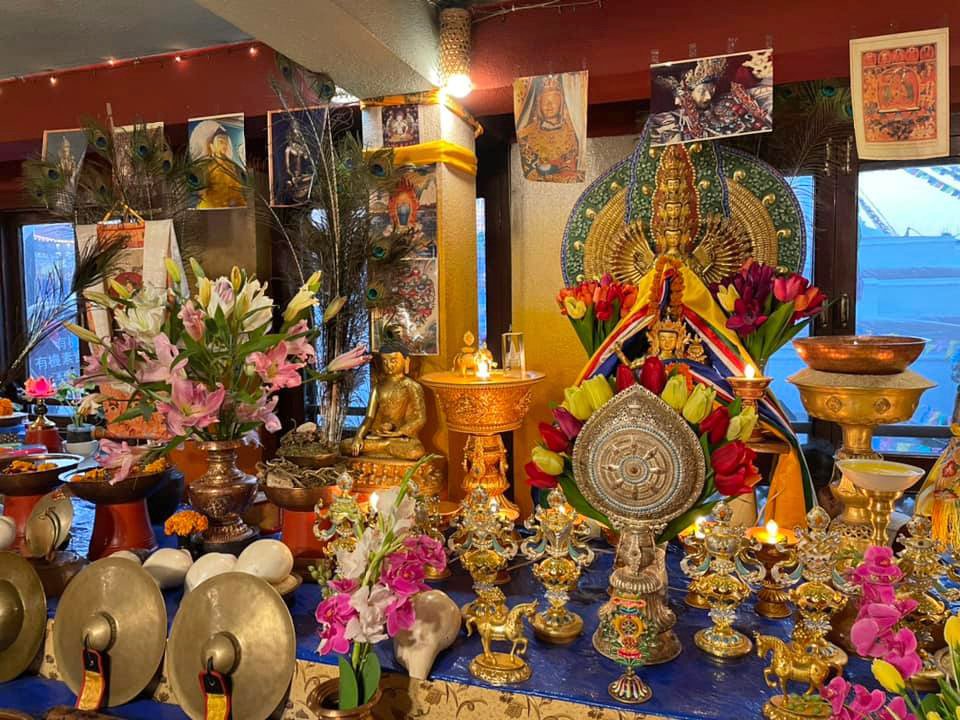
Offering room overlooking Boudha Stupa, Nepal, March 2022. Photo by Ven. Sarah Thresher.
“There’s no question how much merit you will collect with each offering you make to the Stupa while thinking that, in essence, it is your root guru,” Rinpoche says in Offerings to the Boudha Stupa.
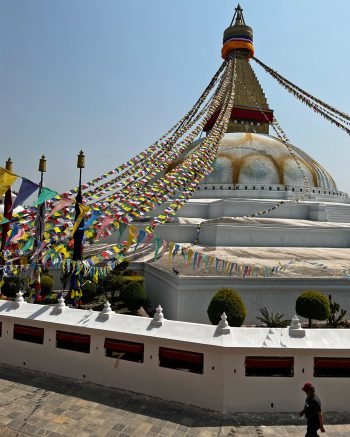
Boudha Stupa, Nepal, March 2022. Photo by Ven. Roger Kunsang.
“You collect the most unbelievable merit and it becomes purification as well. Please think this with any offering you make to the Stupa, and then offer it on behalf of all sentient beings: the offerings are theirs and you are offering them on their behalf. So then every sentient being gets merit—every hell being gets merit, every hungry ghost gets merit, every animal gets merit. For example, every ant gets merit, every mosquito gets merit, and every chick gets merit. No matter how tiny it is and no matter how big it is, every animal gets merit. Also, every human being, every asura, and every sura gets merit. In this way, the offering helps them to become free from their suffering of pain and to receive peace and pleasure.”
Rinpoche frequently goes to Boudha Stupa to circumambulate and to make offerings and prayers. In September 2021, Rinpoche recorded a Thought Transformation Teaching video called, “Making Offerings to Boudha Stupa.” At the beginning of this video, Rinpoche talks about doing a tsog offering practice at Boudha Stupa and the benefits of making offerings to stupas. He explains how offering tsog to stupas makes you achieve all the realizations; offering medicine to stupas stops diseases; and offering grains to stupas stops famine in the world. Rinpoche also discusses how important it is to consecrate stupas, including the benefit of eliminating war. Rinpoche then led an offering practice to Boudha Stupa accompanied by many senior Sangha members. (You can follow along with the offering practice by watching the video.)
Watch Rinpoche making prayers in the offering room next to Boudha Stupa:
Find Offerings to the Boudha Stupa as a PDF in the Foundation Store:
https://shop.fpmt.org/Offerings-to-the-Boudha-Stupa-PDF-_p_3682.html
Through comprehensive study programs, practice materials, and training seminars, FPMT Education nourishes the development of compassion, wisdom, kindness, and true happiness in individuals of all ages.
13
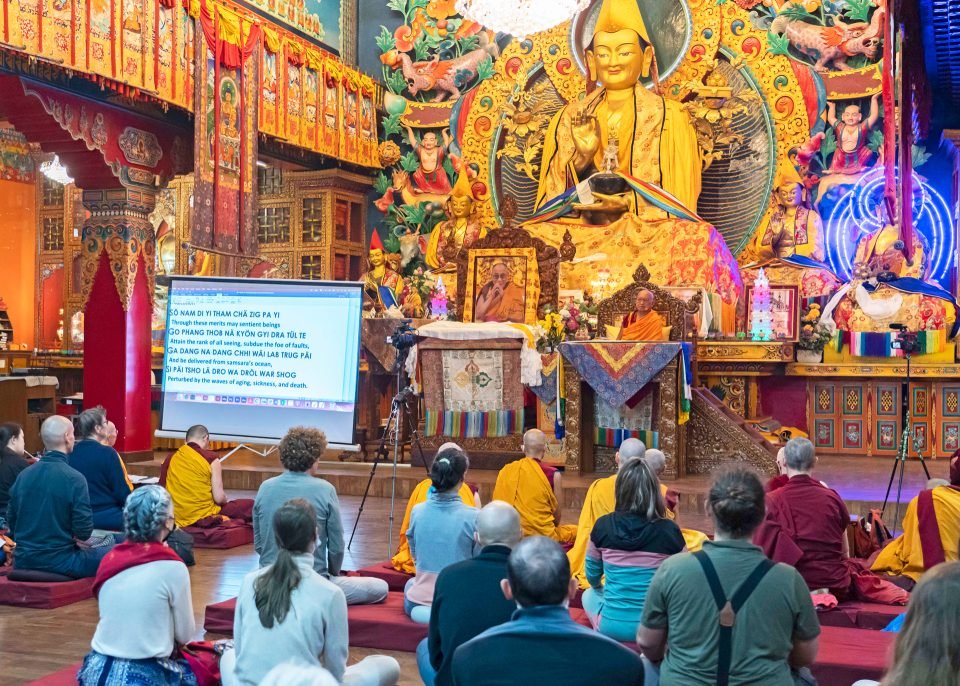
Lama Zopa Rinpoche offering a teaching to students who attended the Vajrasattva retreat at Kopan Monastery, March 2022. Photo by Ven. Lobsang Sherab.
Lama Zopa Rinpoche offered this highly charged teaching on March 30, 2022, to students attending the three-month Vajrasattva retreat at Kopan Monastery in Nepal. Here’s a summary of the teaching with the video below:
Our minds are wrapped up in hallucination, Rinpoche warns. We must use the wisdom of Buddha’s teachings to see the truth, to recognize all the hallucinations we are wrapped up in. The world has so much suffering due to ignorance.
Because we took rebirth, there are problems. To be free from suffering in samsara, we have to be free from delusions and karma, but we are creating the root of samsara twenty-four hours a day due to ignorance! The nature of samsaric pleasure is suffering, however, our ignorance projects real pleasure from its own side! Real pleasure is not there at all, and all the things that appear as real are a total hallucination.
It is very important to know how we hallucinate. Normally we think others hallucinate, but we have been hallucinating from beginningless rebirths up to now and that makes us suffer. Therefore, learning Buddhism, the words and meanings, and practicing it is most important, more important than food and money, Rinpoche explains. If you know Dharma, you come to know that is the most important thing. Money and jobs come from Dharma. In the past you made charity to others, so in this life you have the means of living, food, and shelter. People think money and jobs are the most important things in life. Even those who know Dharma think it is second or third. That is totally wrong. Dharma is first. Everything, including money and jobs, come from cherishing others, from practicing Dharma.
At the end of the teaching, Rinpoche offers the oral transmission of the Vajrasattva mantra (1:30:05) and the oral transmission of Dorje Khadro fire puja practice (1:42:50).
UPDATE (May 4, 2022): Rinpoche has confirmed that one may receive these oral transmissions by watching the video.
We invite you to go deeper into the topics presented here, plus many others, by watching Rinpoche’s video or reading the full transcript of Rinpoche’s teaching.
Watch Lama Zopa Rinpoche’s teaching “Why Buddhism Is So Important”
Lama Zopa Rinpoche gave four teachings to students attending the 2022 Vajrasattva retreat: this introductory teaching on March 30 and three subsequent teachings on April 26–28. You can find them on our page “Teachings for 2022 Vajrasattva Retreatants at Kopan Monastery.”
You can find links to resources to support your Vajrasattva practice and Dorje Khadro practice in the Foundation Store.
This summary of Lama Zopa Rinpoche’s teaching is by Carina Rumrill, based on the live transcript by Ven. Joan Nicell and checked by Laura Haughey, with editorial input and additions by Laura Miller. This summary is meant to highlight key topics presented by Rinpoche in the recorded video and is not intended to serve as a full representation of Rinpoche’s teaching, which is best received through watching the video and/or reading the full transcript.
Lama Zopa Rinpoche is the spiritual director of the Foundation for the Preservation of Mahayana Tradition (FPMT), a Tibetan Buddhist organization dedicated to the transmission of the Mahayana Buddhist tradition and values worldwide through teaching, meditation and community service.
8
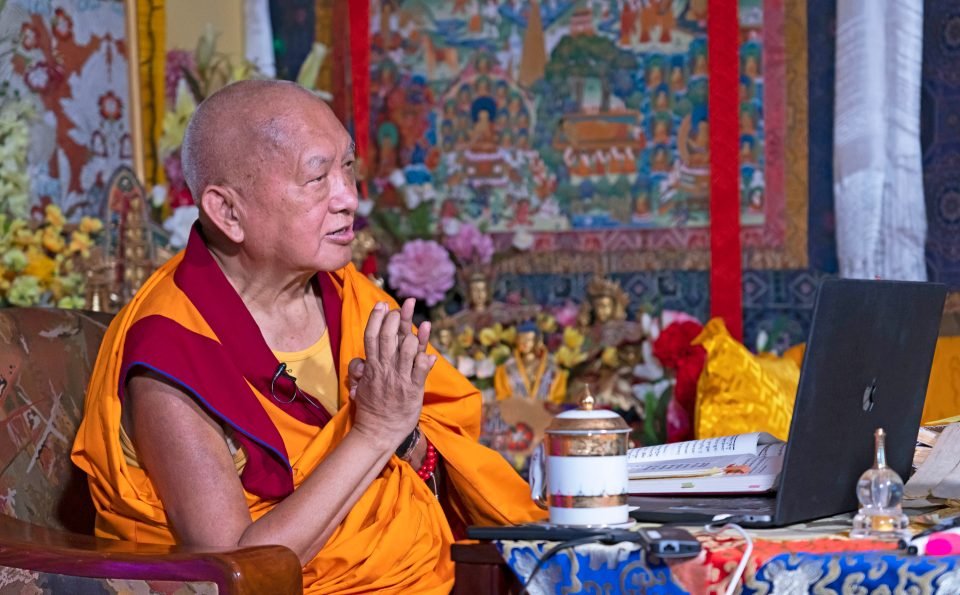
From Kopan Monastery, Rinpoche offering a talk to Sangha at the beginning of a three-month Vinaya course held at Istituto Lama Tzong Khapa, Italy, March 7, 2022. Photo by Ven. Lobsang Sherab.
Lama Zopa Rinpoche offered this video teaching on March 7, 2022, from Kopan Monastery in Nepal to ordained Sangha at the beginning of a three-month course on the Vinaya being held at Istituto Lama Tzong Khapa in Italy. This teaching contains advice that is useful to all of us, lay and ordained alike. Here’s a summary of the teaching with the video below:
In order to live a meaningful life, we need a precise plan, Rinpoche says. This means establishing a daily intention to improve our lives. For example, while establishing a lamrim motivation for the day, one can make the determination not to be controlled by anger, no matter what happens in life that day. This way, during the day when the conditions arise and you are about to get angry, you can remember what you promised in the morning.
Because our minds have been habituated with anger since beginningless rebirths, anger comes like a tsunami. And it is very dangerous. It destroys our liberation by destroying our merit. It also harms others by causing them to get angry, thus destroying their merit and liberation. Since we have a responsibility for every sentient being, we must keep our minds in peace by practicing loving kindness, compassion, patience, contentment, and especially bodhicitta. Furthermore, all of our happiness, including buddhahood, comes from every sentient being.
Rinpoche then addresses the Sangha directly, explaining that Western Sangha are “the real heroes” because becoming ordained in Western culture is very difficult, and it is also very difficult to keep vows in the West. In our culture we praise people who command armies or participate in killing as heroes, but so much negative karma is accumulated, including suffering in the lower realms for eons. The Sangha, however, make war on the delusions, which are the cause of so much suffering to one’s self and others, and they defeat them. They are the real heroes.
Protecting one’s ordination is preserving the Buddha’s teachings. Buddha said in the Sutra of Individual Liberation that the practice of morality is the Buddha. “Kyabje Phabongkha Dechen Nyingpo said your morality is ku tshab, is Buddha, is a substitute of Buddha, a regent of Buddha. Thinking in that way, you must cherish and protect your morality,” Rinpoche explained.
Morality in a country depends on whether or not there are people there practicing Buddha’s teachings. And the presence of teachings depends on whether or not Sangha are there.
“You abandon your happiness by breaking your morality,” Rinpoche warns. There are so many benefits to living in vows, even for lay people living in vows for one day. Rinpoche then outlines and offers commentary on the four doors for receiving downfalls from breaking vows and offers advice on how to prevent downfalls.
In essence, Rinpoche advises, in each second during this one time we have this human rebirth, if we live with renunciation, whatever we are doing becomes a cause of liberation, not a cause of samsara. Each second of remembering emptiness becomes an antidote to samsara; it destroys the root of samsara—ignorance. And in each second, if you remember bodhicitta, everything you do becomes a cause of enlightenment. This is how you can make your life most beautiful, most meaningful, to yourself and to all sentient beings.
We invite you to go deeper into the topics presented here, plus many others, by watching Rinpoche’s video and reading the full transcript of this teaching.
Watch Lama Zopa Rinpoche’s teaching “The Western Sangha Are the Real Heroes”
This summary of Lama Zopa Rinpoche’s teaching is by Carina Rumrill, based on the live transcript by Ven. Joan Nicell and checked by Laura Haughey, with editorial input and additions by Laura Miller. This summary is meant to highlight key topics presented by Rinpoche in the recorded video and is not intended to serve as a full representation of Rinpoche’s teaching, which is best received through watching the video and/or reading the full transcript.
Visit FPMT.org, where you can watch more video teachings from Lama Zopa Rinpoche as part of his Teachings on Thought Transformation and find links to related videos, transcripts, MP3s, and additional practice advice, and where you can also discover more advice from Rinpoche specifically for Sangha.
Lama Zopa Rinpoche is the spiritual director of the Foundation for the Preservation of Mahayana Tradition (FPMT), a Tibetan Buddhist organization dedicated to the transmission of the Mahayana Buddhist tradition and values worldwide through teaching, meditation and community service.
- Tagged: advice from lama zopa rinpoche, ethics, lama zopa rinpoche advice for sangha, sangha, video, vows
6
The Definition of Having Generated Bodhicitta
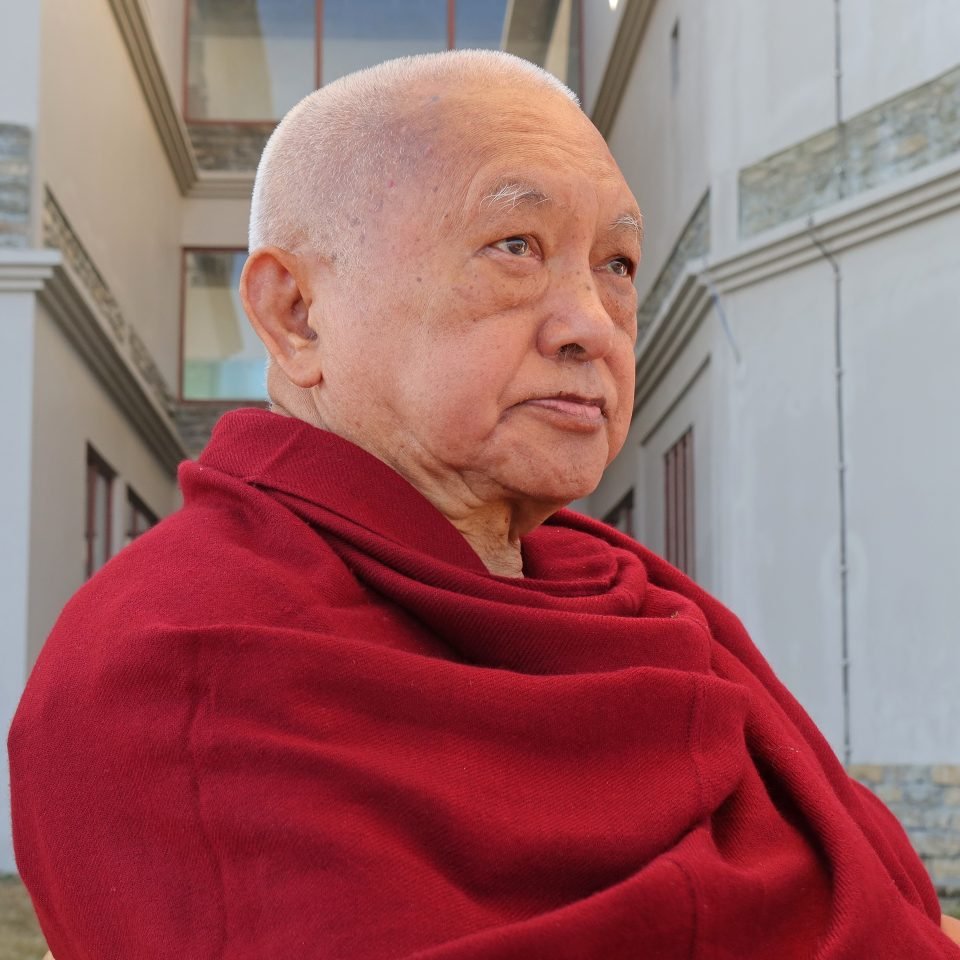
Lama Zopa Rinpoche, Pokhara, Nepal, December 2021. Photo by Ven. Roger Kunsang.
The following video is an Essential Extract from Lama Zopa Rinpoche. Essential Extracts are short videos extracted from a longer teachings that focuses on a specific topic. We have more than two hundred Essential Extract videos available on our website. We also routinely share these Essential Extract videos in blog posts, which include transcripts and links to additional materials. Here is a short Essential Extract on generating the mind of bodhicitta.
In the video, Rinpoche describes how you need to develop unbelievably strong compassion before realizing bodhicitta. The example given is of a mother whose greatly cherishes child falls into a fire. She can’t stand that her child is suffering in the fire for even one second. However many minutes or seconds it takes to save the child, it’s too long for her mind. Rinpoche explains that our minds should be like the mother’s mind: we can’t stand that the countless mother sentient beings are experiencing unbearable suffering for one more second. And on this basis, we develop the effortless wish to achieve omniscience.
In the video Rinpoche is referring to Phabongkha Rinpoche’s commentary on Lama Tsongkhapa’s Three Principal Aspects of the Path. In particular, the commentary is on this stanza from the section “The Definition of Having Generated the Mind of Enlightenment”:
In short, if like the mother whose cherished son has fallen into a pit of fire
And who experiences even one second of his suffering as an unbearable eternity,
Your reflection on the suffering of all mother sentient beings
Has made it impossible for you to bear their suffering for even one second
And the wish seeking enlightenment for their sake arises without effort,
Then you have realized the supreme precious mind of enlightenment.
Watch the video “The Definition of Having Generated Bodhicitta”:
Read the transcript for this Essential Extract:
https://fpmt.app.box.com/s/af91ega3quffors6clch5g2mkak0m4j4
The above video is extracted from a Thought Transformation Teaching video recorded on October 24, 2020, at Kopan Monastery in Nepal. You can find more blogs with short video clips from Rinpoche’s teaching as well as the complete collection of these “Essential Extracts” videos on FPMT.org.
Watch videos from the series Lama Zopa Rinpoche’s Teachings on Thought Transformation and find links to transcripts, MP3s, additional practice advice, and more. Read an in-depth summary of Rinpoche’s thought transformation teachings given in 2020 in the Mandala 2021 article “The Time to Practice Is Now.”
Lama Zopa Rinpoche is the spiritual director of the Foundation for the Preservation of Mahayana Tradition (FPMT), a Tibetan Buddhist organization dedicated to the transmission of the Mahayana Buddhist tradition and values worldwide through teaching, meditation and community service.
- Tagged: advice from lama zopa rinpoche, bodhichitta, essential extract, essential extract thought transformation teachings, video
1
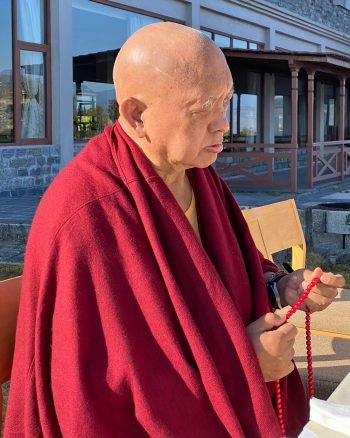
Lama Zopa Rinpoche in Pokhara, Nepal, December 2021. Photo by Ven. Roger Kunsang.
Our time to practice Dharma is fleeting. Lama Zopa Rinpoche encourages students to meditate on impermanence and death so that instead of just listening to Dharma, we put the teachings of the Buddha into practice.
Here is a short summary of Rinpoche’s teachings on impermanence and death from “The Time to Practice is Now,” a detailed overview of the 2020 Thought Transformation Teachings given by Rinpoche. A short video of Rinpoche teaching on this topic follows the excerpt.
Rinpoche explains that all the teachings of the Buddha are to subdue our minds. However, for the teachings to do that, we first need to meditate on impermanence and death. Without remembering impermanence and death we will listen to teachings, such as those on lojong, and even think that they are nice, but we won’t put them into practice. Instead we will put them away in a box, intending to keep them for later. But because we have no idea when we are actually going to die (and indeed we are running toward death all the time), we don’t have the luxury of waiting until we are old to start practicing. The time is now. Unlike other subjects in Buddhism, the subject of death and impermanence is easy to understand. At the same time, it is incredibly important! We must think about it from the depths of our hearts because without continually remembering death and impermanence we won’t achieve realizations and complete the path to enlightenment.
When we don’t think of death, our mind becomes totally distracted by the outside five sense objects, the pleasures of this life, as well as by our friends and enemies. All of our hard work is for this life’s happiness only, and nothing we do becomes holy Dharma. All the mistakes we make, especially in terms of wasting our life, happen due to not having an awareness of death and impermanence. As long as we are still clinging to the happiness of this life, we won’t practice holy Dharma. Our actions become only worldly dharma, non-virtue. Giving up the attachment clinging to the happiness of this life is the very first Dharma practice. This is achieved by remembering death and impermanence.
If we think of our death—if we remember that our death can happen this year, this month, this week, even today—it brings our mind inside, and we examine our own life. We come to realize that there is no point in being attached to our wealth and other objects of desire. Since we have to leave everything behind, why be attached to dream-like objects of desire?
Since beginningless rebirths we have been harming others due to attachment and desire. Our mind has cheated us by following attachment and by using everything, including our body, merits, possessions, and other people, in the wrong way—to create suffering instead of happiness. But remembering death stops the delusions—such as anger, attachment, ignorance, and self-cherishing—from arising and stops us from engaging in negative karma.
At the time of death, there is no more time to think about and transform our minds. When our whole life has been under the control of the self-cherishing thought and attachment to this life, at the time of death we will see that we have not only wasted this precious human life, but our actions have been negative.
Therefore, thinking about death and being afraid of the suffering in samsara is so useful to a Dharma practitioner. It makes us practice Dharma sincerely in order to become free from the oceans of samsaric sufferings and lower nirvana, and to achieve great nirvana, or enlightenment, in order to be able to free the numberless sentient beings from the oceans of samsaric sufferings and bring them to enlightenment.
Watch the Essential Extract “Without Remembering Impermanence-death, You Won’t Practice Lojong”:
In this Essential Extract, Lama Zopa Rinpoche explains that all the teachings of the Buddha are to subdue our minds. However, for the teachings to do that, we first need to meditate on impermanence-death. Without remembering impermanence-death we will listen to teachings, such as those on lojong, and even think that they are nice, but we won’t put them into practice. Instead we will put them away in a box!
Read the transcript of this video extract from Rinpoche’s teaching:
https://fpmt.box.com/s/ysiv9518wtflh7uqd78kqgvp05w4q5i5
You can find more blogs with short video clips from Rinpoche’s teaching as well as the complete collection of these “Essential Extracts” videos on FPMT.org.
Lama Zopa Rinpoche is the spiritual director of the Foundation for the Preservation of Mahayana Tradition (FPMT), a Tibetan Buddhist organization dedicated to the transmission of the Mahayana Buddhist tradition and values worldwide through teaching, meditation and community service.
- Tagged: advice from lama zopa rinpoche, death and dying, essential extract, essential extract thought transformation teachings, impermanence and death, video
29
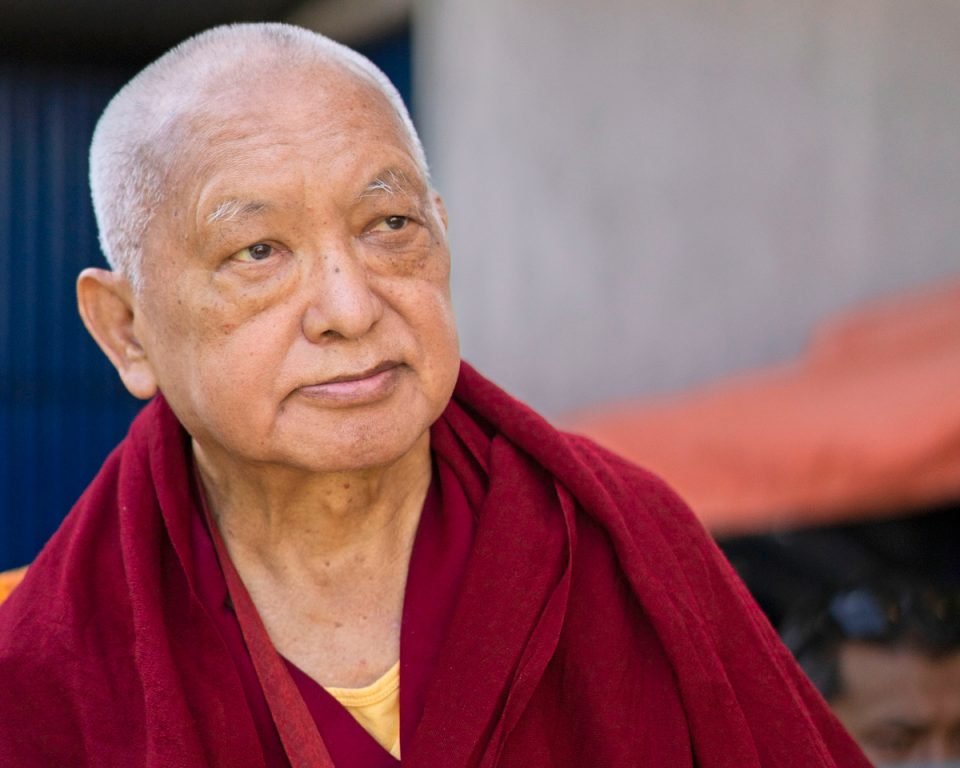
Lama Zopa Rinpoche during a visit to the Dickey Tsering Children’s Home in Kathmandu, Nepal, November 2021. Photo by Ven. Lobsang Sherab.
The Six Perfections: The Practice of the Bodhisattvas (2020) by Lama Zopa Rinpoche has been recently released in a paperback edition. In the book, Rinpoche walks us through the six perfections, which are a key Mahayana Buddhist teaching. Here’s an excerpt from Rinpoche’s teaching on the perfection of charity:
Keeping our mind pure—free from pride, miserliness, and so forth—is very difficult for ordinary people like us. If we could give simply, without all these disturbing thoughts clouding our giving, our generosity would be perfect and attaining another perfect human rebirth would be easy. But this is a struggle for most of us. That is why we must always check our motivation and be diligent in observing our karma.
The villagers of Solu Khumbu, where I was born, have a very good custom to protect themselves and others. Because they are incredibly poor, theft is always a problem. Things are often stolen: cooking pots, money—even potatoes. In many villages the people bury pots of their precious potatoes outside to keep them safe, but thieves can generally guess where the pots are buried, and they dig them up. Also, sometimes people borrow things and don’t return them, no matter how much the owner complains and shouts.
In such cases of theft, the villagers often go to a monastery and ask the lama there to say prayers and dedicate the merit of the prayer to the thief, totally offering them that thing. Whether or not this becomes a virtuous act does not depend on the lama but on the mind of the victim. If the person can renounce the stolen object completely and offer it to the thief with compassion, then it is virtuous. The owner needs the object, but the thief also needs it, and so by renouncing it and offering it to the thief with compassion, the dedication becomes a virtuous action.
If somebody stole a hundred dollars from us and we cannot do the practice of dedication—if we cannot take the loss upon ourselves and offer the victory to that sentient being; if we still cling to that hundred dollars—how can we perfect the practice of charity? Even without considering how kind that sentient being has been, how precious they are, we should rejoice that they needed something and now they have it. Like us, they want happiness and do not want suffering—in that way they are completely equal to us—so why can’t they have that hundred dollars? If we were to find a hundred dollars, how happy we would be. If we were to find a thousand dollars or a million dollars, we would be so surprised and excited. We would clap our hands with joy. So why can’t we do the same thing for this sentient being who has come across a hundred dollars?
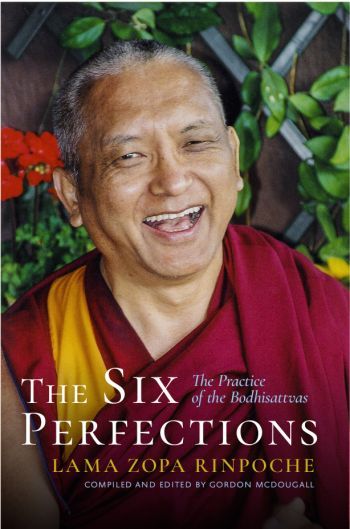
Cover of Lama Zopa Rinpoche’s book The Six Perfections
Learn more about The Six Perfections: The Practice of the Bodhisattvas, including order information, on Wisdom Publication’s website:
https://wisdomexperience.org/product/the-six-perfections/
The Six Perfections is also available as an e-book from the Foundation Store.
Watch the video series Lama Zopa Rinpoche’s Teachings on Thought Transformation and find links to videos in translation, transcripts, MP3s, additional practice advice, and more.
Lama Zopa Rinpoche is the spiritual director of the Foundation for the Preservation of Mahayana Tradition (FPMT), a Tibetan Buddhist organization dedicated to the transmission of the Mahayana Buddhist tradition and values worldwide through teaching, meditation and community service.
- Tagged: charity, lama zopa rinpoche, wisdom publications
24
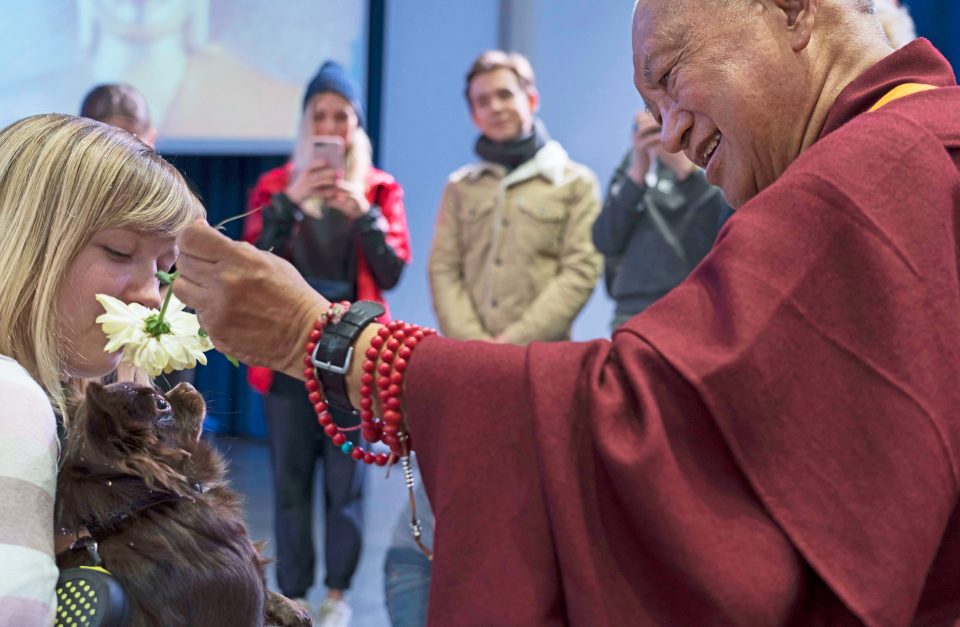
Lama Zopa Rinpoche blessing a dog at an animal blessing in Moscow, Russia, 2019. Photo by Ven. Lobsang Sherab.
The following video is an Essential Extract from Lama Zopa Rinpoche. Essential Extracts are short videos extracted from a longer teachings that focus on a specific topic. We have more than two hundred Essential Extract videos available on our website. We also routinely share these Essential Extract videos in blog posts, which include transcripts and links to additional materials. Here is a short Essential Extract on the importance of providing Dharma imprints for our pets.
In this video, Lama Zopa Rinpoche tells a story about a dog from Tushita Meditation Centre in Dharamsala that he gave to a woman in Delhi. Rinpoche asked her to recite a lamrim prayer and mantra to the dog, which she did. Rinpoche praises her so much for doing this every day. Hearing the prayers saves the dog from the lower realms, frees it from samsara, and brings it to enlightenment. Therefore, this is also what we need to do for our own beloved pets!
Watch the Essential Extract “Just Giving Food and Shelter to Our Pets Is Not Enough”:
Read the transcript of this video extract from Rinpoche’s teaching:
https://fpmt.box.com/s/rair1ijp8zlrwui3nuw7afcwhdc2p0oi
Find more advice and resources for helping pets on our Benefiting Animals page:
https://fpmt.org/education/prayers-and-practice-materials/benefiting-animals-practices-and-advice/
You can find more blogs with short video clips from Rinpoche’s teaching as well as the complete collection of these “Essential Extracts” videos on FPMT.org.
Lama Zopa Rinpoche is the spiritual director of the Foundation for the Preservation of Mahayana Tradition (FPMT), a Tibetan Buddhist organization dedicated to the transmission of the Mahayana Buddhist tradition and values worldwide through teaching, meditation and community service.
- Tagged: advice from lama zopa rinpoche, animals, essential extract, essential extract thought transformation teachings, taking care of animals, video
22
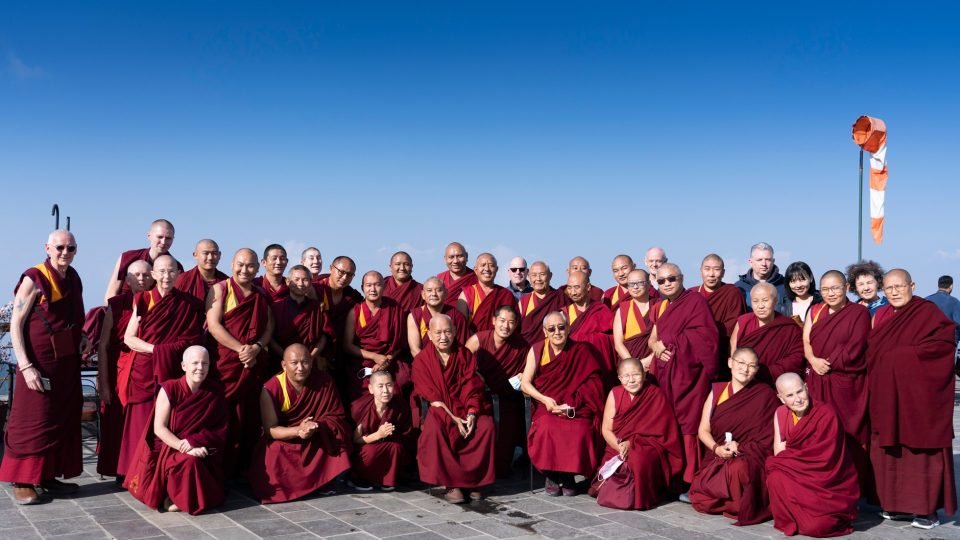
Lama Zopa Rinpoche with the geshes and geshemas who teach philosophy at Kopan Monastery and Nunnery, senior nuns, some Kopan staff, and a few lay students at the Chandragiri Hill Resort, Nepal, November 2021. Photo by Ven. Lobsang Sherab.
The following video is an Essential Extract from Lama Zopa Rinpoche. Essential Extracts are short videos extracted from longer teachings that focuses on a specific topic. We have more than two hundred Essential Extract videos available on our website. We also routinely share these Essential Extract videos in blog posts, which include transcripts and links to additional materials. Here is a short Essential Extract on the bravery of ordained sangha.
In this video, Lama Zopa Rinpoche explains how ordained monks and nuns, the sangha, are real heroes. They are incredibly brave because they are conquering the delusions that have kept us in samsara from beginningless rebirths. Each sangha member has been a hero for however many years, months, and weeks they have been ordained.
Rinpoche explains that the numberless buddhas and bodhisattvas are happy with us for conquering delusions and are helping us, but we have to do the work. We have to recognize that delusion is the real enemy. Delusion has been defeating us from beginningless rebirths, but now we defeat delusion! That is Dharma practice. That is real Dharma.
Watch the video “The Sangha Are Real Heroes Because They Are Defeating Delusion”:
Read the transcript of Rinpoche’s teaching:
https://fpmt.box.com/s/il1h3stjbenp9uzxm7t8n10xj1wgzb6z
Learn more about FPMT ordained sangha:
https://fpmt.org/centers/sangha/
The above video is extracted from the Thought Transformation Teaching video recorded on July 12, 2020, at Kopan Monastery in Nepal. You can find more blogs with short video clips from Rinpoche’s teaching as well as the complete collection of these “Essential Extracts” videos on FPMT.org.
Watch videos from the series Lama Zopa Rinpoche’s Teachings on Thought Transformation and find links to transcripts, MP3s, additional practice advice, and more. Read an in-depth summary of Rinpoche’s thought transformation teachings given in 2020 in the Mandala 2021 article “The Time to Practice Is Now.”
Lama Zopa Rinpoche is the spiritual director of the Foundation for the Preservation of Mahayana Tradition (FPMT), a Tibetan Buddhist organization dedicated to the transmission of the Mahayana Buddhist tradition and values worldwide through teaching, meditation and community service.
- Tagged: advice from lama zopa rinpoche, essential extract, essential extract thought transformation teachings, sangha, video
11
The Karma of Killing
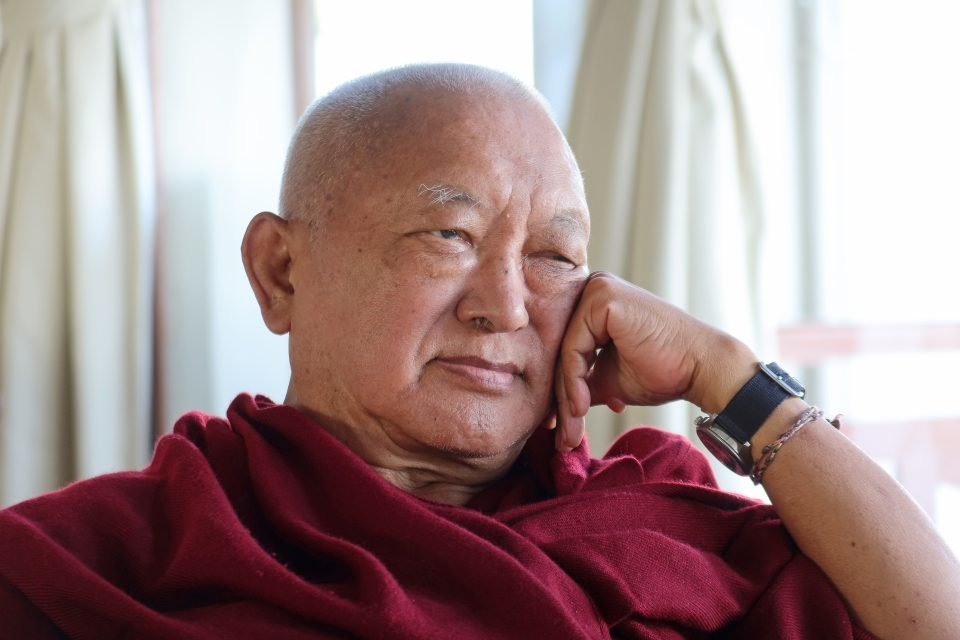
Lama Zopa Rinpoche, Pokhara, Nepal, December 2021. Photo by Ven. Roger Kunsang.
The following video is an Essential Extract from Lama Zopa Rinpoche. Essential Extracts are short videos extracted from a longer teachings that focuses on a specific topic. We have more than two hundred Essential Extract videos available on our website. We also routinely share these Essential Extract videos in blog posts, which include transcripts and links to additional materials. Here is a short Essential Extract on the karma of killing.
In this short video, Lama Zopa Rinpoche comments on how sad it is that there are children who kill snakes to make a living. Rinpoche reminds us that anyone who kills even one sentient being, will have to experience the four suffering karmic results of killing.
Rinpoche explains the karmic results of killing in the following way:
- The complete negative karma of killing a snake has the ripened-aspect result of rebirth in hell, in the lower realms.
- The possessed result is that even when good karma ripens and you are reborn as a human being, you still suffer and have many problems in life, including dangers of death, because of killing a snake. You live in places where there are a lot of contagious diseases, obstacles to your health, and so forth.
- There is experiencing the result similar to the cause. This is when others kill you as the result of the past karma of killing the snake.
- There is creating the result similar to the cause. As a result of the past negative karma of killing a snake, even if it was just once, you want to kill again. You created a habit for killing. Then when you kill again, the negative karma created has the four suffering results again. So it goes on and on, on and on. It makes endless suffering of samsara.
Lama Zopa Rinpoche stresses how it is therefore sooooooo important and even urgent to abandon committing the ten non-virtues, including killing, and to practice Dharma.
Watch the video “Karma of Children Who Kill Snakes”:
Read the transcript of Rinpoche’s teaching:
https://fpmt.box.com/s/3e5nqxh8s39xs8nfstae1cv4km2z5e07
The above video is extracted from a Thought Transformation Teaching video recorded on December 9, 2020, at Kopan Monastery in Nepal. You can find more blogs with short video clips from Rinpoche’s teaching as well as the complete collection of these “Essential Extracts” videos on FPMT.org.
Watch videos from the series Lama Zopa Rinpoche’s Teachings on Thought Transformation and find links to transcripts, MP3s, additional practice advice, and more. Read an in-depth summary of Rinpoche’s thought transformation teachings given in 2020 in the Mandala 2021 article “The Time to Practice Is Now.”
Lama Zopa Rinpoche is the spiritual director of the Foundation for the Preservation of Mahayana Tradition (FPMT), a Tibetan Buddhist organization dedicated to the transmission of the Mahayana Buddhist tradition and values worldwide through teaching, meditation and community service.
- Tagged: advice from lama zopa rinpoche, essential extract, essential extract thought transformation teachings, karma, video
8
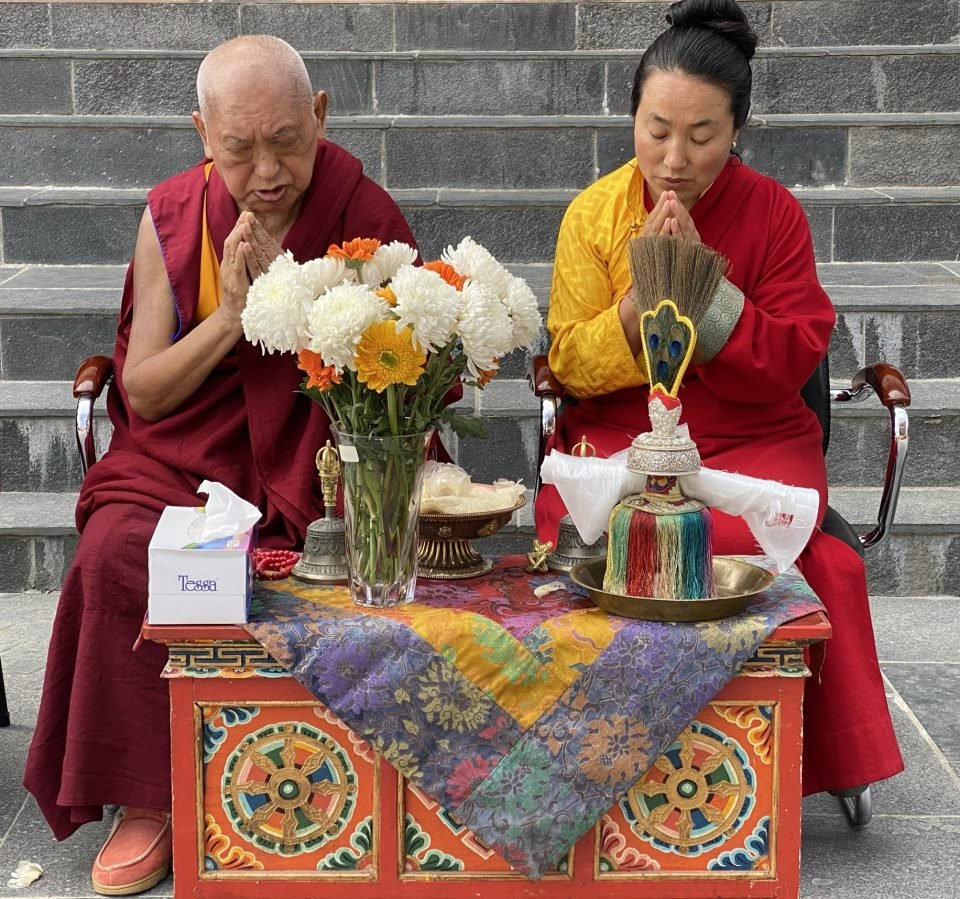
Lama Zopa Rinpoche and Khadro-la during the consecration of large appliqué Twenty-one Taras thangkas and the Eight Taras That Save from Fear thangkas outside Kopan Gompa, Kopan Monastery, Nepal, January 2021. Photo by Ven. Roger Kunsang.
In the new book The Power of Mantra: Vital Practices for Transformation, Lama Zopa Rinpoche guides students through understanding the power and benefit of mantras. Rinpoche explains many popular mantras, giving specific instructions for practicing them, including Shakyamuni Buddha, Chenrezig, Manjushri, Tara, Medicine Buddha, Vajrasattva, and more. In an excerpt from the chapter on Tara mantra, Rinpoche discusses Mother Tara:
The benefits of practicing Tara are uncountable. By reciting the Praises to the Twenty-One Taras with devotion, at dawn or dusk, and remembering Tara and reciting her mantra at any time of the day or night, we are protected from fear and danger, and all our wishes are fulfilled. If we pray to Tara, Tara will grant help quickly.
She is especially quick in granting us success in obtaining the ultimate happiness of enlightenment, but there are also many temporal benefits of reciting the Tara mantra or the Praises to the Twenty-One Taras prayer. Tara can solve many problems in life: liberating us from untimely death, helping us recover from disease, bringing us success in business. Somebody with a serious problem, such as a life-threatening disease, who relies on Tara will very commonly be freed from that problem. For instance, His Holiness the Dalai Lama encouraged us to recite Tara’s mantra as a protection for ourselves and others against the coronavirus COVID-19.
Pabongka Dechen Nyingpo tells a story of one of his students who didn’t know much Dharma but had faith in Tara and so received help from her, but not as much as he might have. One day during his journey to Mongolia, while walking along reciting Tara prayers, he heard a dog barking and saw a tent. Because he needed some water to quench his thirst, he went there, where he saw a young girl, alone, tending many yaks. Seeing the monk was weak and hungry, she insisted he stay with her for a few days and she fed him. When it was time to leave, she gave him some tsampa and other food. Because he was completely lost, she gave him very explicit directions on how to get to his destination and, as he was leaving, she gave him a large bunch of grass. She explained that when he awoke each morning, he should drop some grass on the ground and head in whichever direction it fell.
He only had a little food, enough for a day or two, but each day, when he opened the sack, his food was never depleted. Following the directions the girl had given him, he managed to find his way to his destination. When he looked in his sack at the very end of his journey, there was not one speck of food left. He was so surprised with this that he sent a letter to his guru, Pabongka Rinpoche, in Lhasa. Rinpoche wrote back and said that it was a pity he hadn’t followed the girl’s instructions completely. If he had, he would have been in a pure realm already. That yak herder was a manifestation of Tara, but he was unable to see this. Tara manifests in many aspects, not just the green and white forms that are commonly depicted.
Tara is like our mother. Take my mother as an example. She did all the work while the rest of us—there were three of us—were useless. One day, she had to go into the forest to get the firewood. Because none of us could make food, we waited outside the door for her to return so we could eat. When she came back very late with a very heavy load of firewood, she could not make a fire because she was sick. She lay down next to the fireplace in so much pain. There was no fire in the stove and no food. She was screaming, calling for her mother: “Ama! Ama!” (My grandmother, who was still alive at that time, lived quite near.) Because none of us could make one, there was no fire; we just sat and watched our mother. Even adults call for their mother when they have bad pain or a serious problem. However, Tara is much closer to us than a mother, and she is quick to grant us help and protect us from danger.
The Praises to the Twenty-One Taras begins, “I prostrate to the noble transcendent liberator.” That means that Tara herself is completely liberated from the whole of samsara and the cause of samsara through having completed the both the method and wisdom sides of the practice. Not only that, by having overcome the two obscurations, gross and subtle, she is also free from being bound to lower nirvana. Liberated from both samsara and the peace of lower nirvana means she is fully enlightened. And because she in turn liberates all of us, allowing us to attain full enlightenment, she is called Tara the Liberator, the mother who liberates.
From The Power of Mantra: Vital Practices for Transformation by Lama Zopa Rinpoche; compiled and edited by Gordon McDougall; published by Wisdom Publications (WisdomExperience.org), where you can order the paperback or digital versions of the book. You can also find the ebook and PDF version in the Foundation Store (shop.fpmt.org).
Find more resources for your Tara practice as well as recent advice on mantra practices for His Holiness the Dalai Lama and Lama Zopa Rinpoche on our website (FPMT.org).
Lama Zopa Rinpoche is the spiritual director of the Foundation for the Preservation of Mahayana Tradition (FPMT), a Tibetan Buddhist organization dedicated to the transmission of the Mahayana Buddhist tradition and values worldwide through teaching, meditation and community service.
- Tagged: 21 taras, lama zopa rinpoche, mantra, wisdom publications
25
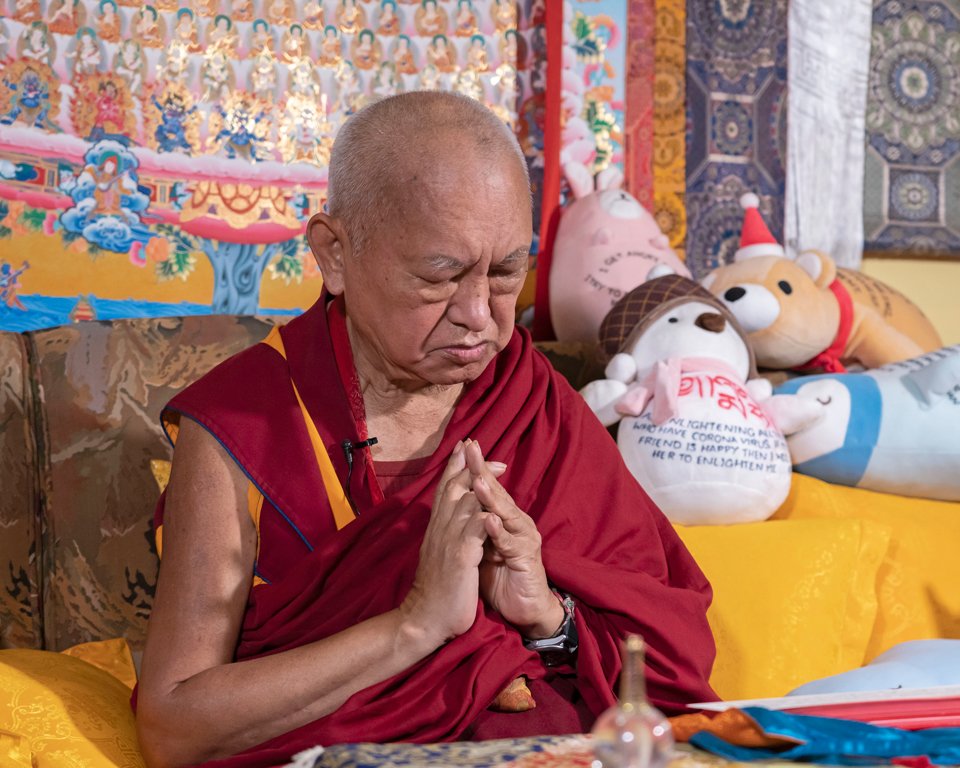
Lama Zopa Rinpoche making prayers, at Kopan Monastery, March 2021. Photo by Ven. Lobsang Sherab.
Lama Zopa Rinpoche has given the following advice regarding practices to do in response to the current situation in Ukraine at this time, to reduce the war and to help stop the violence and suffering. Rinpoche has also already arranged a number of powerful pujas, such as controlling fire puja, wrathful fire pujas, and Drugchuma (Sixty-Four Offerings to Kalarupa).
With a bodhicitta motivation and strong dedication, Rinpoche is advising the following practices:
- Recitation of “Padmasambhava—The Prayer to Guru Rinpoche that Spontaneously Fulfills All Wishes” (Sampa Lhundrupma) | Download
- Recitation of “Padmasambhava—The Supplication to Guru Rinpoche Clearing the Obstacles on the Path” (Barchey Lamsel) | Download
- Recitation of White Umbrella practice
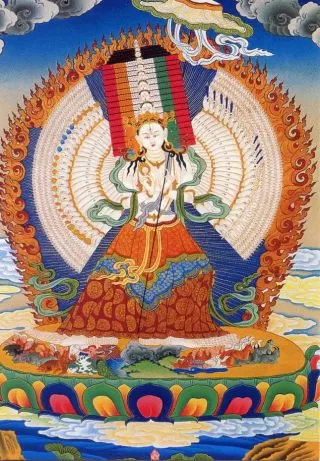
White Umbrella deity.
General Motivation:
The ultimate purpose of my life is to do perfect work for others. In order to fulfill that purpose, it is necessary for me to achieve the state of full enlightenment, omniscient mind, and in order to do that, I must actualize the path to enlightenment. Therefore, I am going to do actions that become only causes for me to achieve enlightenment and to bring all sentient beings to enlightenment as quickly as possible. May all my actions become only causes for me to achieve enlightenment and to bring all sentient beings to enlightenment as quickly as possible.
General Dedications:
To Actualize Bodhicitta
Due to all the past, present, and future merits collected by me and all the merits of the three times collected by numberless buddhas and numberless sentient beings, may bodhicitta be generated in the hearts of all the sentient beings of the six realms, and especially in the hearts of everybody in this world, including all the students, benefactors, and volunteers in the FPMT organization. May it be generated in the hearts of all those who rely upon me, all those for whom I have promised to pray, and all those whose names have been given to me. May it be generated in my heart
For Peace and Happiness to Prevail in the World
Due to all the past, present, and future merits collected by me, the numberless buddhas, and the numberless sentient beings, may all wars—particular the current situation in Ukraine—famines, diseases, global problems, and all dangers of earth, water, fire, and wind be stopped immediately. May perfect peace and happiness prevail in everyone’s hearts by their generating loving kindness, compassion, and bodhicitta. May the Buddhadharma, from where sentient beings receive peace and happiness, last a long time and spread in all directions. May all sentient beings meet the Buddhadharma and achieve enlightenment as quickly as possible.
To Seal the Merits with Emptiness
Due to all the past, present, and future merits collected by me, the numberless buddhas, and the numberless sentient beings, which are completely empty of existing from their own side, may I, who am completely empty of existing from my own side, achieve the state of full enlightenment, which is completely empty of existing from its own side, and lead all sentient beings, who are completely
empty of existing from their own side, to that state, which is completely empty of existing from its own side, by myself alone, who am completely empty of existing from my own side.
To Dedicate in the Same Way as All the Past Buddhas
and Bodhisattvas
I fully dedicate all these virtues
To be able to train just like
The hero Mañjuśrī, who knows reality,
And just like Samantabhadra as well.
I fully dedicate all my roots of virtue,
With the dedication praised as the best
By all the gone-beyond victorious ones of the three times
In order to have good conduct.
Motivation and dedications taken from A Daily Meditation on Shakyamuni Buddha, by Lama Zopa Rinpoche.
Valuable and timely advice from Lama Zopa Rinpoche can be found on Rinpoche’s advice page.
Lama Zopa Rinpoche is the spiritual director of the Foundation for the Preservation of Mahayana Tradition (FPMT), a Tibetan Buddhist organization dedicated to the transmission of the Mahayana Buddhist tradition and values worldwide through teaching, meditation and community service.
24
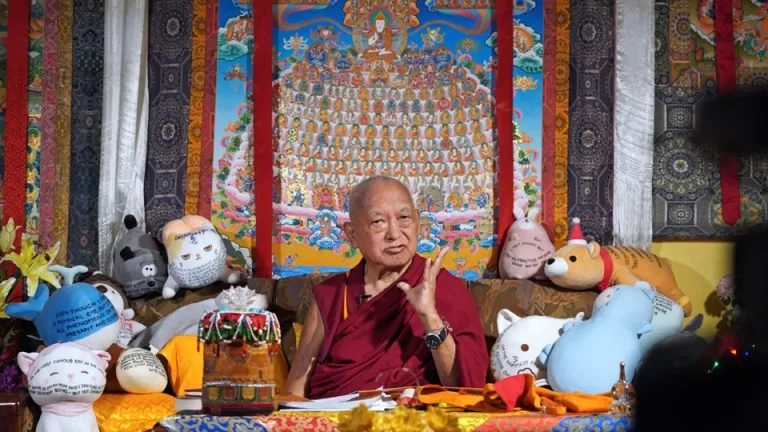
Lama Zopa Rinpoche teaching on make offerings on the anniversary of the guru’s passing away, Kopan Monastery, Nepal, March 2021. Photo by Ven. Lobsang Sherab.
Last year, Lama Zopa Rinpoche translated and commented on a short Tibetan text during his ongoing thought transformation teachings. The text explains the importance of making offerings on the anniversary of the passing away of one’s guru. Rinpoche’s translation and commentary have now been published in the booklet Advice for the Anniversary of the Guru’s Passing Away, available from the Foundation Store.
The new booklet is being offered to inspire students and centers to do practices, such as Lama Chopa with Tsog Offering, on Losar, the Tibetan New Year, in relation to Lama Yeshe, who founded the FPMT organization with his heart disciple Lama Zopa Rinpoche. Losar is of special significance to the FPMT community as it marks the anniversary of the passing of Lama Yeshe.
Rinpoche praised his beloved teacher last year from Kopan Monastery:
“Lama Yeshe, whose holy name is extremely difficult to mention and whose kindness is difficult to express, took the aspect of passing away early in the morning of the first day of the Tibetan New Year (Losar) in 1984. I was with Lama for many years and all the FPMT centers, as well as several schools and hospices, were started by him.
“I have been meaning to explain for some time what to do on the anniversary of Lama Yeshe’s passing away (gong dzog) but it didn’t happen until now. As explained in the text, A Hundred Clear Realizations of the Glorious One from Narthang by Namkha Drag, you should make offerings on that day by, for example, doing Lama Chopa and Tsog Offering. You can also do the same on the anniversary of the passing away of your other lamas, such as Choden Rinpoche and Ribur Rinpoche. Making offerings on the death anniversary of a guru is an incredible practice in that it brings about the greatest purification of negative karma and collects the most extensive merit.”
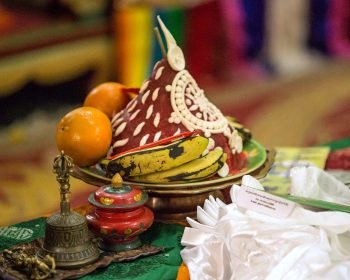
Tsog offering, India, February 2017. Photo by Paola Regis.
Rinpoche’s translation of Advice for the Anniversary of the Guru’s Passing Away sets out the benefits of making offerings, how to make offerings with six remembrances, and how to offer and dedicate the roots of virtue collected. Doing practices such as Lama Chopa with tsog is what is meant by “Making offerings on the anniversary of the guru’s passing away.” In other words, these offerings include offering tsog and are not just setting out a lot of water bowls, flowers, and so forth.
For more on Advice for the Anniversary of the Guru’s Passing Away, please see Rinpoche’s thought transformation teachings “Make Offerings on the Anniversary of Your Guru’s Passing Away” and “Make Offerings Thinking You Are Offering Them to Your Guru’s Pores.”
Rinpoche also recommends introducing new students to Lama Yeshe on Losar and taking time to remember him by watching videos of him teaching and reading stories about his life.
Find Advice for the Anniversary of the Guru’s Passing Away on the Foundation Store:
https://shop.fpmt.org/Advice-for-the-Anniversary-of-the-Gurus-Passing-Away-PDF-_p_3668.html
Find more advice from Lama Zopa Rinpoche on practices to do during Losar and the Fifteen Days of Miracles, please see:
https://fpmt.org/edu-news/practice-advice-and-rejoicing-for-losar-and-the-fifteen-days-of-miracles
Lama Zopa Rinpoche is the spiritual director of the Foundation for the Preservation of Mahayana Tradition (FPMT), a Tibetan Buddhist organization dedicated to the transmission of the Mahayana Buddhist tradition and values worldwide through teaching, meditation and community service.
- Home
- News/Media
- Study & Practice
- About FPMT Education Services
- Latest News
- Programs
- New to Buddhism?
- Buddhist Mind Science: Activating Your Potential
- Heart Advice for Death and Dying
- Discovering Buddhism
- Living in the Path
- Exploring Buddhism
- FPMT Basic Program
- FPMT Masters Program
- FPMT In-Depth Meditation Training
- Maitripa College
- Lotsawa Rinchen Zangpo Translator Program
- Universal Education for Compassion & Wisdom
- Online Learning Center
- Prayers & Practice Materials
- Overview of Prayers & Practices
- Full Catalogue of Prayers & Practice Materials
- Explore Popular Topics
- Benefiting Animals
- Chenrezig Resources
- Death & Dying Resources
- Lama Chopa (Guru Puja)
- Lama Zopa Rinpoche: Compendium of Precious Instructions
- Lama Zopa Rinpoche: Life Practice Advice
- Lama Zopa Rinpoche Practice Series
- Lamrim Resources
- Mantras
- Prayer Book Updates
- Purification Practices
- Sutras
- Thought Transformation (Lojong)
- Audio Materials
- Dharma Dates – Tibetan Calendar
- Translation Services
- Publishing Services
- Teachings and Advice
- Find Teachings and Advice
- Lama Zopa Rinpoche Advice Page
- Lama Zopa Rinpoche: Compendium of Precious Instructions
- Lama Zopa Rinpoche Video Teachings
- ༧སྐྱབས་རྗེ་བཟོད་པ་རིན་པོ་ཆེ་མཆོག་ནས་སྩལ་བའི་བཀའ་སློབ་བརྙན་འཕྲིན།
- Podcasts
- Lama Yeshe Wisdom Archive
- Buddhism FAQ
- Dharma for Young People
- Resources on Holy Objects
- Ways to Offer Support
- Centers
- Affiliates Area
- Teachers
- Projects
- Charitable Projects
- Make a Donation
- Applying for Grants
- News about Projects
- Other Projects within FPMT
- Support International Office
- Projects Photo Galleries
- Give Where Most Needed
- FPMT
- Shop
Translate*
*powered by Google TranslateTranslation of pages on fpmt.org is performed by Google Translate, a third party service which FPMT has no control over. The service provides automated computer translations that are only an approximation of the websites' original content. The translations should not be considered exact and only used as a rough guide.Death could come any minute so transform your life into Dharma.







